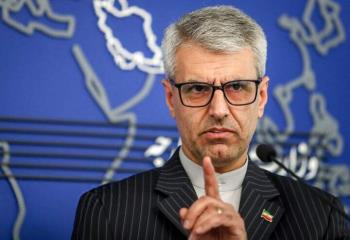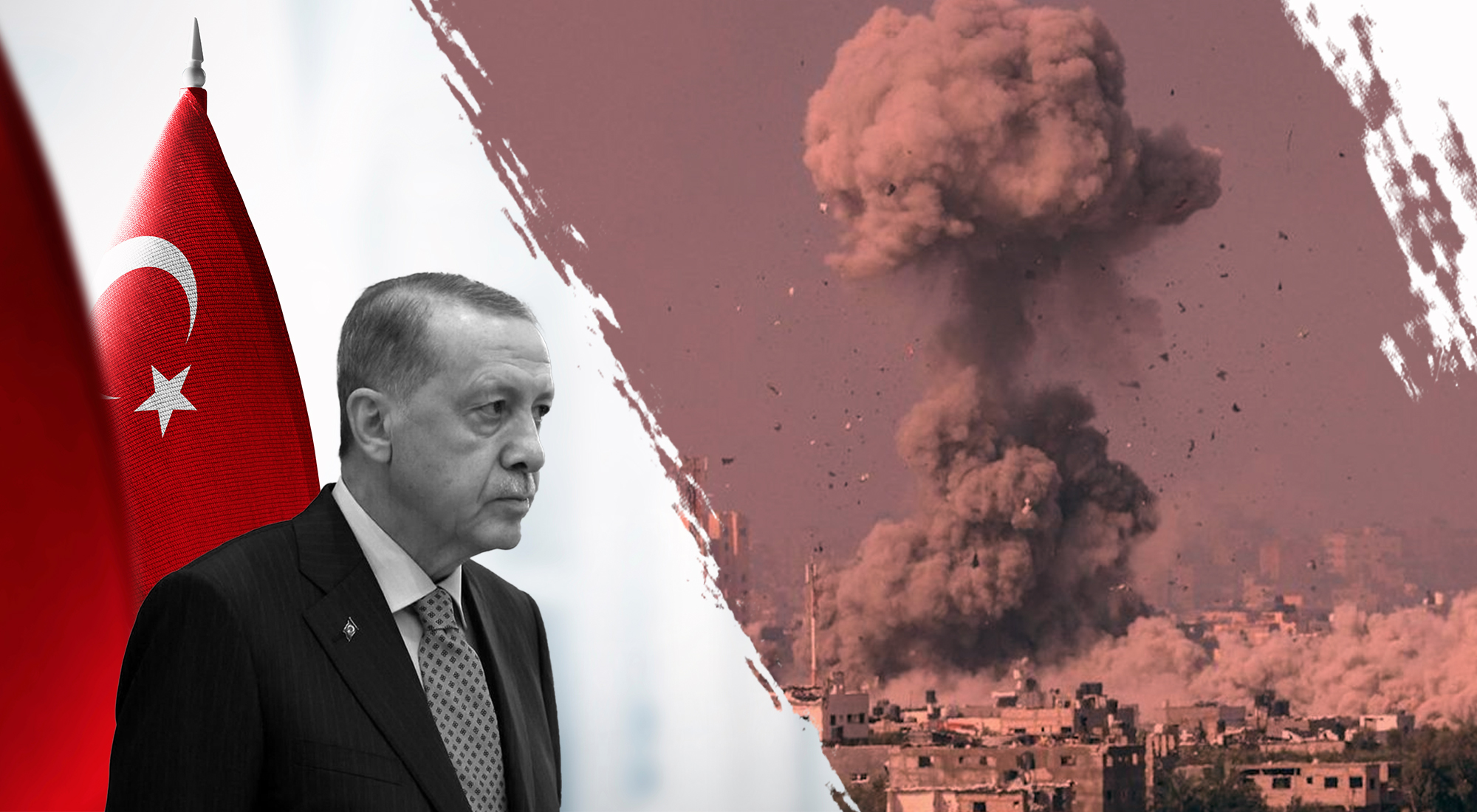Alwaght- Israeli airstrike on Qatar targeting Hamas leaders has triggered heightened concerns across Turkey as the Turks think they could be the next target of rampant Israeli attacks in the region.
In this connection, the spokesman to the Turkish defense ministry Rear Admiral Zeki Akturk on Thursday warned that Israel " would further expand its reckless attacks, as it did in Qatar, and drag the entire region, including its own country, into disaster.”
Ankara regards this Israeli action not as a separate development but as part of a broader model of Israeli behavior that directly threatens the national security and regional interests of Turkey.
1. Roots of Turkish worry: from violation of sovereignty to change of balance of power
The Turkish worry rests on several main pillars:
Systematic violation of sovereignty of countries: Ankara is observing with alarm as Israel continues to attack the airspace and territory of various countries, including Iran, Syria, Lebanon, Yemen, and recently Qatar, with a seeming sense of impunity. According to Serhat Suha Çubukçuoğlu, director of the Turkey Program at the Trends Research and Advisory Institute, these actions are setting a dangerous precedent that circumvents international norms and regional air defense systems.
The 'Greater Israel' plan within the American 'Greater Middle East' project: Turkish analysts believe the Israeli regime is pursuing a major strategy to weaken neighboring countries and create a security belt of weak or subservient states around itself. As part of this strategy, there should be no strong, large states bordering the occupied territories; larger regional countries must be broken up into smaller, weaker units than Israel. This design is based on the larger American project for the region, conceived during the George W. Bush era and dubbed the "Greater Middle East" or "New Middle East" initiative.
This perspective is reinforced by statements from officials like Rear Admiral Aktürk, who warned that Israel will expand its reckless attacks.
Turkey as a potential target: The presence of some Hamas officials and members in Turkey—a country Israel has previously accused of planning operations from its soil—has raised concerns that Turkey could be Israel's next target. Israeli officials, including Netanyahu, have repeatedly threatened to pursue Hamas members "wherever they are." These statements carry symbolic weight, as approximately 40 of these individuals were transferred to Turkey as part of the Gilad Shalit prisoner exchange deal.
Does Israel have the power to attack Turkey?
Analysts are divided on the possibility of Israeli actions against Turkey. One camp, including Özgür Ünlühisarcıklı, director of the German Marshall Fund in Ankara, believes a direct military attack by Israel on the soil of a NATO member is "highly unlikely," citing Turkey's NATO membership and its powerful military. However, they view covert operations—such as assassinations or bombings by Mossad against Hamas-related targets in Turkey—as a clear and plausible possibility.
A second camp argues that a direct attack should not be considered impossible. They emphasize Israel's pattern of bypassing international laws and norms under the protective umbrella of American support. They also point to the frosty relations between NATO and Turkey under Erdogan, particularly following the war in Ukraine and Ankara's refusal to align with Western sanctions against Moscow. As the attack in Qatar demonstrated, having strong ties with Washington does not necessarily guarantee protection from Israel.
2. Areas of strategic confrontation and competition
The tensions between the two sides has been dragged to various areas:
Syria: Syria has become the center of strategic competition between the Israeli regime and Turkey. Since December last year when the Turkish-aligned militants ousted President Bashar al-Assad government, tensions have been growing between Ankara and Tel Aviv. Turkey has been supporting the new Syrian government and expanding its its influence in the neighboring Syria in various areas, including militarily. While it stresses respecting Syrian territorial integrity and security of its borders against Kurdish militant groups, Israeli has been repeatedly attacking the government of Ahmad al-Sharaa, better known for his nom de guerre Abu Mohammad al-Jolani, and Turkish facilities in Syria and working to establish a buffer zone in the southern Syria and supporting minorities like the Druze and moving close to the Kurds as part of a campaign to weaken the central Syrian government and split the country. So, striking the Turkish forces or Ankara allies in Syria by Israel is a high possibility, especially that Tel Aviv conducted an operation in Syria simultaneous with its Doha attack, something perceived as a message to the Turkish side.
Eastern Mediterranean: Tensions could also flare in the Eastern Mediterranean, where competition over gas reserves and naval influence continues. Israel has grown closer to Greece and the Greek Cypriot administration in recent years, a move Ankara perceives as an effort to challenge Turkey's military presence in Northern Cyprus. Turkey accuses Israel of joining an anti-Turkey coalition aimed at imposing a maritime blockade and sidelining Ankara from regional energy projects.
The Kurdish issue: From Ankara's perspective, Israel's support for Kurdish autonomy in Syria and Iraq is an attempt to create a focal point of instability and separatism on its southern border. This is seen as a direct threat to Turkey's national security and its ambitions of becoming a regional energy hub. Turkey has long promoted pipeline projects to transport gas from the Persian Gulf through its territory to Europe, aiming to reduce the continent's dependence on Russian energy. However, Israel—often with Washington's backing—has countered these ambitions by supporting Kurdish autonomy and federalism in Iraq and Syria. These actions are viewed in Ankara as undermining the territorial continuity and stability required for pipeline routes and risk exacerbating Kurdish separatist sentiments along Turkey's own borders.
3. Turkish responses/ From diplomacy to military readiness
Reacting to these threats, Turkish had embarked on a multi-faceted strategy:
Diplomatic and Economic Measures: Ankara claims to have significantly scaled back trade relations with Israel and has officially suspended all commercial exchanges in protest to the blatant Israeli genocide in Gaza. According to its ministry of trade, bilateral trade with Israel between October 7, 2023, and May 2, 2024, fell by 32 percent compared to the same period the previous year. Turkish exports dropped by 30 percent, while imports from the occupied territories decreased by 43.4 percent.
These tensions have extended into Turkish airspace. In November 2024, the Israeli Prime Minister was denied overflight rights, forcing him to cancel his attendance at the Climate Change Summit (COP) in Azerbaijan. A similar incident occurred in May 2025, preventing another Netanyahu flight to Baku.
These moves were met with retaliation from Benjamin Netanyahu, who officially recognized the 1915 Armenian genocide, driving tensions back up just months after a period of normalization between the two sides.
According to analysts, the escalation of tensions with Israel is "no longer based solely on humanitarian or moral reasons, but on deeper strategic shifts linked to Turkey's national security and intensifying regional competition, particularly in Syria and the Eastern Mediterranean."
Kâhit Töz, a former cabinet advisor, told the New Arab newspaper: "Turkey has concluded that Israel is not only destabilizing the region but is also targeting Turkey itself. This is not a passing threat, but an existential one."
Bolstering Military Deterrence: Relying on its advanced defense industry and the second-largest military in NATO, Turkey is rapidly enhancing its defense capabilities. The unveiling of the integrated "Steel Dome" air defense system, increased production of ballistic and cruise missiles, and major investments in domestic projects like the KAAN fighter jet and the Kızılelma drone all point to Ankara's resolve to raise the cost of any hostile action. Turkish officials have explicitly warned that any violation of their airspace will be met with a swift and decisive response.
Defense Diplomacy in Syria: The signing of a military cooperation and training agreement with the Syrian government signals Turkey's effort to solidify its position and create a more united front against Israeli operations in the country. Last month, Ankara and Damascus signed a deal under which Turkey will provide military training and advisory services to the Syrian armed forces.
4. Future of developments: Between deterrence and escalation
The future of the Israeli-Turkish relations depends on. Set of factors:
Scenario of limited escalation: The most likely scenario is continued tensions on indirect fronts like Syria, where Turkey can, in response to Israeli attacks on its allies, strike Israeli targets in Syria. This can spiral into a gradual escalation cycle.
Scenario of attacking Hamas in Turkey: the decision to target Hamas officials on Turkish soil would mark a highly dangerous turning point and could trigger a full-blown crisis between the two sides. Turkey has previously warned that Israel would "pay a heavy price" for such an action. In recent years, Turkish security services have uncovered several Mossad networks operating inside Turkey that were targeting Hamas and Palestinian figures—a situation that prompted Turkish president to warn Tel Aviv about a heavy price for any covert operations on Turkish territory.
The role of external actors: The response of the US and NATO in the event of a direct confrontation between two of their allies remains a key unknown variable. The experience of Qatar demonstrates that even strong relations with Washington do not completely shield countries against unilateral Israeli actions.
Conclusion
The Turkish concerns about possible Israeli action is no longer a political difference over Palestine, rather, it is a deep strategic confrontation that directly targets Turkey's national security, economic interests, and regional ideals and ambitions. From Turkish viewpoint, Israel has evolved into a direct and existential threat given its violation of sovereignty of countries and push to tip the scales of power against Ankara's interests. Meanwhile a question should be asked: Does this mean the time of a direct confrontation is nearing?



























